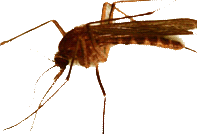Four mosquito pools were tested in Whiting. Three tested positive for Eastern Equine Encephalitis. The fourth tested positive for West Nile virus. Mosquitoes can transmit the diseases to people and animals. The health department does not perform exhaustive statewide testing of mosquitoes but views the Whiting test results as evidence that Vermont residents should keep the health issues in mind.
"The positive samples are the first evidence of EEE and West Nile virus in Vermont this year," said State Epidemiologist Patsy Kelso. "It is a good reminder these viruses are circulating in Vermont and people should take precautions to avoid mosquito bites."
The health department recommends the following precautions:
- Wearing long sleeves and long pants.
- Avoiding outdoor activities at dusk and dawn.
- Taking measures to reduce standing water in which mosquitoes breed.
- Using insect repellents.
- Maintaining screens on home windows and doors.
Most people bitten by a West Nile virus-carrying mosquito will experience no symptoms. Up to 20 percent of people infected with the virus may experience fever, headache, body aches, nausea, vomiting. A much smaller percentage will develop life-threatening illnesses.
Eastern Equine Encephalitis is much more rare in humans. As with West Nile, most infected people have no symptoms. However, several cases of serious to severe EEE infection occur in the U.S. each year, generally in the Atlantic and Gulf Coast states. In severe cases, the illness can lead to swelling of the brain. The mortality rate of severe infections is as high as 33%. The disease is extremely dangerous to horses, where its mortality rates are 70% or higher. There is no cure for EEE. Many horses in eastern and southern states are routinely vaccinated against the virus.
These viruses are said to originate in bird populations. While direct bird-to-human transmission is not impossible, mosquitoes are generally responsible for moving it.
According to the National Center for Biotechnology Information, mosquitoes carry the highest amounts of these viruses in the early fall, after a summer of interaction with birds.
Thirteen West Nile virus cases have been reported in neighboring New York State so far this year, according to the Wall Street Journal. Two older people have died of the disease. New York health officials have detected West Nile in 714 mosquito pools across the state. None to date have been found to be infected with EEE. Massachusetts has reported high levels of EEE-infected mosquitos - the highest number in 30 years. Several days ago, CNN reported that the U.S. is experiencing the worst West Nile virus outbreak ever seen. At that point, 38 states had reported human infections. A total of 1,118 people had been infected with 44 related deaths reported.


No comments:
Post a Comment